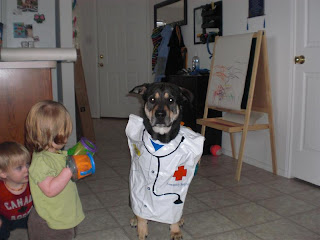I'm sure you know the importance of exercise for physical health. This is going to be about the importance of exercise for your mental health (with a few physical health tips thrown in).
It has been proven that exercise in kids increases their perception, creativity, concentration, and IQ. That's impressive. How many other things can do all of that at the same time? More importantly, the research shows that early life matters. The earlier in life that exercise happens, the better the health and cognitive benefits. What would take a 40 year old 2 hours of exercise to accomplish can be done in 30 minutes by a toddler. Frustrating as an adult, but this is a clear sign of how to help your child.
Grandma playing with our feet is funny
Disease risks result from an accumulation of experiences according to Dr. Kosik, the co-director of the Neuroscience Research Institute at the University of California, Santa Barbara. When you think about the opposite, it makes sense. If you are exposed to a toxic substance in small amounts throughout life it starts to add up. So, while you might not see a problem at first, you will eventually have to deal with the accumulation of the toxin in your body. Therefore, exercise also helps the accumulation of positive, disease fighting processes in the body. Throughout life your education, diet, exercise, and many other factors can shift your health trajectory to a better (or worse) one.
Wee!
An increase in aerobic fitness was studied in students in the 3rd - 9th grades. The increase in fitness aligned with an increase in Reading and Math scores. If you want better test scores, don't get rid of P.E. and recess. Teachers have been able to see the difference in their students and knew this instinctively, but now there's neuroscience to back it up.
Hi there!
Since I have a family history of Alzheimer's disease, I've also been following the research on how to prevent or treat this cognitive disorder. The most effective treatment they have found so far? Exercise. It's showing better results than any of the medications. This is not to say that we shouldn't treat with medication, but we can't ignore the importance of treating with exercise as well. They have also been studying the brain scans of people at risk for Alzheimer's and discovered that the disease actually starts 10-30 years before the first symptoms appear outwardly. If you know it's starting before symptoms, you can treat early and slow the progression. Granted, most people don't get brain scans before having neurological symptoms. This is why it is even more important to exercise as an adult to prevent cognitive decline. An absence of cognitive challenges has also been proven to increase the risk of cognitive decline. Most people pick 1-2 ways to challenge themselves cognitively and stick with them throughout life. You might play chess, solve crossword puzzles, or play an instrument. While all of these are great, if you have been doing them for years, you will not be building new brain mapping. Try something you aren't as comfortable with - learn a new language, take a painting class, or study photography. It's always good to start learning something new, but the most important time to learn these things to prevent (or slow) Alzheimer's is in your 40's-60's.

These chairs aren't comfortable.
Random fact that is mostly unrelated to this post: Some savants have no visible differences in their brain scans from the rest of us "normal" people.


















